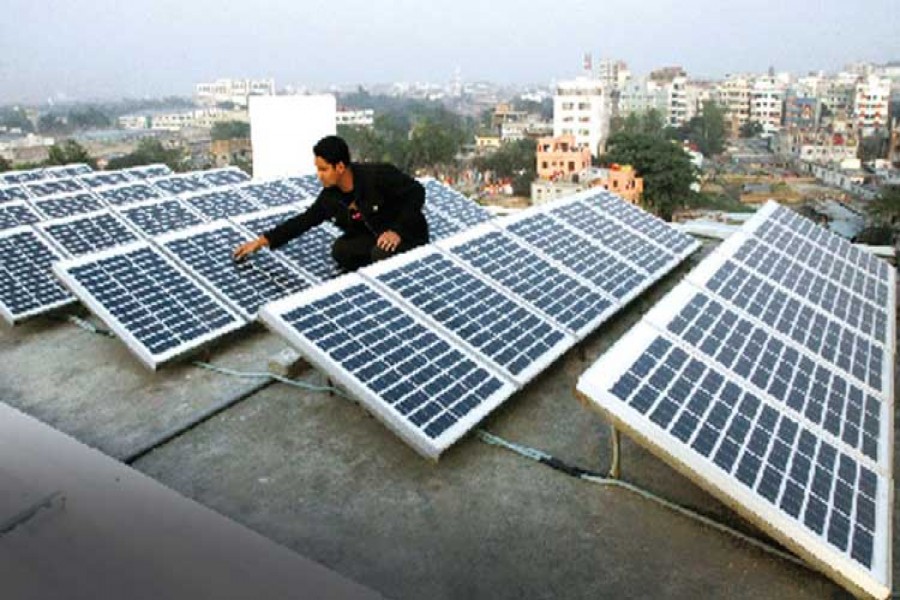
Published :
Updated :

There is hardly any load-shedding now-a-days. Just compare the present days with those of the past. Even a decade ago, frequent power disruption was the norm. The situation has now vastly improved but still is far from ideal. Energy security is vital for economic growth. The small and medium enterprises which now employ most of the people in cities and rural areas across Bangladesh could run well if the country could achieve it.
It makes a sad commentary on the state of affairs that lack of coordination between the Rural Electrification Board (REB) and providers of Solar Homes Systems (SHS) has resulted in sheer wastage of what Bangladesh has so far achieved in solar energy. With coverage of more areas with rural electrification, most of the families who had bought SHS have shelved those off with machinery including solar panels rusting in the backyard. This will surely exert pressure on the REB grid.
The government should immediately make a survey of this gross wastage and find solution to why people connected with solar energy are going for fuel-generated electricity. More so, because the country's Gross Domestic Product (GDP) growth has been rising since 2015-16 fiscal year. The country is presently moving towards the goals of Vision 2021. Industries and services sectors have to contribute more to achieve this height. Capital machinery import has grown at more than 40 per cent. This means, the country is gradually moving towards energy-intense economy. But then it will be difficult to maintain this growth rate if the authorities fail to ensure primary energy supply.
In 2009, the power generation capacity was below 5,000 megawatt (MW). Due to firm commitment of this government, the generation capacity has now reached 15,000 MW. Shortage of gas had led the authorities to go for its rationing. Bangladesh is now importing electricity from neighbouring India but there are risks in import of fuel - price sensibility and supply constraint - raising the economic vulnerability. In 1997, when crude oil prices shot up, the Bangladesh economy suffered. That is why the country needs to have options in place to thwart the risks of price sensibility and supply constraint in fuel import. The remedy is renewable energy and energy efficiency. This will minimise cost and protect environment.
Doubtlessly, the government deserves thanks for setting a target of generating 2,000MW of electricity from renewable sources in the next three years. This will be 10.0 per cent of the country's total power production. "We are working to increase power generation from renewable sources at a faster phase so it would meet at least 10.0 percent of the total demand for electricity in 2020," said State Minister for Power, Energy and Mineral Resources Nasrul Hamid the other day.
Currently, 447.51MW of electricity is coming from renewable sources, which is 2.87 per cent of the total power generation, according to the Ministry of Power, Energy and Mineral Resources. "Some special measures for increasing renewable energy production have been taken in line with the Seventh Five Year Plan," the state minister said. Bangladesh has already topped a global list of renewable energy using countries, with installing the highest number of Solar Home Systems. Over 4.5 million SHS have already been installed under a programme of the Infrastructure Development Company Limited (IDCOL), which is promoting and financing for renewable energy initiatives and energy-efficient projects through public-private-partnership (PPP). Nearly 13 million beneficiaries are getting solar power from these SHS. The power generation capacity now has reached 15,596.51MW including 447.51MW from renewable sources. Al Gore, a global leader on environment, said," Once the renewable infrastructure is built, the fuel is free forever. Unlike carbon-based fuels, the wind and the sun and the earth itself provide fuel that is free, in amounts that are effectively limitless."
Happily, Bangladesh has initiated dialogue with an international venture called Green Grid Alliance so that the country could be connected with a global grid that is being stipulated. The Alliance is thinking of installing plants in deserts like Sahara, India's Rajasthan and in China for harnessing solar power with connectivity through a superhighway. Bangladesh might also be connected through the Green Grid Alliance under their plan. This will be cost-effective and carbon-negative. This will abandon the need for billions of dollar investment in power production, building coal terminals and plants and lots of risks are there.
Bangladesh can immensely benefit from such a global connectivity to get electricity. The country has to think of taking the global pace in power generation. The priority now should be how to ensure sustainable energy and energy efficiency. The regional power connectivity has now come to the forefront. If Bangladesh can become part of regional power grid like those in Europe, then it will be a different picture. The country can team up with Nepal and Bhutan to take 5,000 MW of hydro-power, which is a clean energy, and this will give a base-load of 5,000MW. Bangladesh should try to optimise the productive use of sunshine.
arjayster@gmail.com


 For all latest news, follow The Financial Express Google News channel.
For all latest news, follow The Financial Express Google News channel.